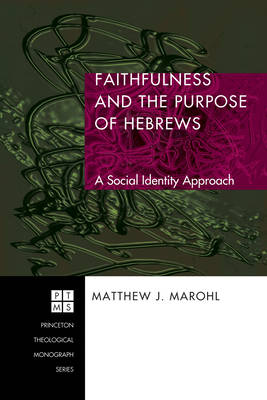
- Retrait gratuit dans votre magasin Club
- 7.000.000 titres dans notre catalogue
- Payer en toute sécurité
- Toujours un magasin près de chez vous
- Retrait gratuit dans votre magasin Club
- 7.000.0000 titres dans notre catalogue
- Payer en toute sécurité
- Toujours un magasin près de chez vous
66,45 €
+ 132 points
Format
Description
Faithfulness and the Purpose of Hebrews offers fresh answers to several unresolved questions by employing that branch of social psychology known as social identity theory. Who were the addressees? With the categories of social identity theory, this study argues that the addressees arranged the world into two groups: "us" and "them." They understood their group, the "us," to be the "faithful." They understood "them" (a symbolic outgroup of "all others") to be the "unfaithful." Faithfulness, then, is the primary identity descriptor for the addressees and plays an essential role thoughout the text. How did the addressees understand the faithfulness of Jesus? The author of Hebrews describes the faithfulness of Jesus as "prototypical." The faithfulness of all others is described in relation to Jesus' faith, and together they are integrated into an ongoing narrative of faithfulness. What is the meaning of the promised "rest"? Utilizing a model of present temporal orientation, the study interprets the dynamic relationship between the "antecedent" faithfulness of many witnesses and the "forthcoming" promised rest of the addressees. The addressees of Hebrews were encouraged to "understand their futures by looking to the past." What is the purpose of the text? Social identity theorists explain that groups with a negative social identity have two broad options: social mobility or social change. The study concludes that the author of Hebrews provides internal constraints that are meant to prevent social mobility. The author utilizes social creativity (an aspect of social change) to provide a positive social identity for the addressees.
Spécifications
Parties prenantes
- Auteur(s) :
- Editeur:
Contenu
- Nombre de pages :
- 228
- Langue:
- Anglais
- Collection :
- Tome:
- n° 82
Caractéristiques
- EAN:
- 9781498250313
- Date de parution :
- 01-01-08
- Format:
- Livre relié
- Format numérique:
- Genaaid
- Dimensions :
- 152 mm x 229 mm
- Poids :
- 476 g

Les avis
Nous publions uniquement les avis qui respectent les conditions requises. Consultez nos conditions pour les avis.






